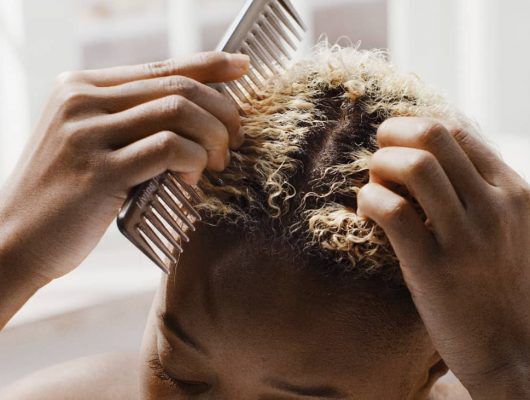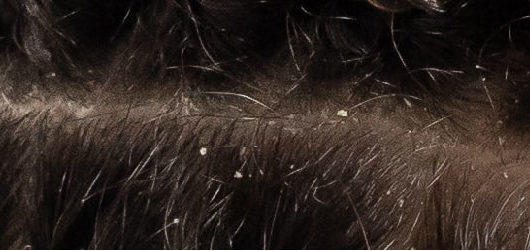
8 Dry Scalp Treatment Remedies [+ Causes & Prevention Tips]
A dry scalp can disrupt your entire haircare routine, leaving you searching for a reprieve from itching, flaking, and redness. It can sometimes feel as though there’s no end in sight to the discomfort, but there’s good news: For every cause of dry scalp, from reactions to products to exposure to environmental elements, there’s a dry scalp treatment — one that will deliver much-needed relief.
In this article, we’ll discuss at-home remedies to nourish your scalp and restore the overall health of your hair, plus tackle the root cause of the issue, so you can say goodbye to dry scalp for good.
What is dry scalp?
Dry scalp occurs when the scalp loses its natural moisture, leading to flakiness, itchiness, and irritation, which can leave your scalp feeling uncomfortable and sensitive. If left unaddressed, dry scalp can also lead to scabbing due to frequent itching.
There are several factors that can contribute to this dryness, including frequent washing with harsh shampoos and skin conditions such as eczema. On top of that, external factors such as cold, dry air in the winter can exacerbate the issue, further dehydrating your scalp. Understanding these triggers is the first step toward restoring the delicate balance of your scalp and hair’s health.
If you have dry scalp, you’re not alone. According to research published in the Journal of Investigative Dermatology Symposium Proceedings, 39% of adults in the United States have experienced some flaking, and almost 50% have complained of scalp itch — both common symptoms of a dry scalp. Since it’s such a common condition, there are numerous dry scalp treatments available. With the right haircare routine and a little patience, you too can put an end to the discomfort and frustration of dry scalp.
Dandruff vs. dry scalp
While dry scalp and dandruff share some similar symptoms, such as itching and flakiness, they’re distinct conditions with different causes and treatments.
Dry scalp is caused when the skin of the scalp loses essential moisture, leading to dryness, itchiness, irritation, and inflammation. In some cases, dry scalp can create a tight, uncomfortable sensation. Like dandruff, dry scalp can cause flakiness. However, these flakes consist of dead skin cells shed from the outermost layer of the scalp and tend to be smaller in size and white in color.
By comparison, both dandruff and seborrheic dermatitis are caused by an overgrowth of a yeast-like fungus called Malassezia, which naturally occurs within the scalp’s microbiome. When this fungus multiplies excessively, it disrupts the scalp’s delicate balance, which leads to increased shedding of dead skin cells. These flakes are larger in size, oilier in texture, and can be white or yellow. As a result, dandruff tends to be more noticeable and can be more difficult to manage without targeted treatments.
If you’re unsure whether you’re dealing with dry scalp or dandruff, take a closer look at the flakes and note how your scalp feels. Understanding the difference between these conditions can help you identify the right treatment and restore your scalp to a healthy, comfortable state.

What causes dry scalp?
Your scalp, like the rest of your skin, requires regular care to look and feel its best — but which dry scalp treatment you use will depend on its underlying cause. To restore it to full health, start by determining which of the following factors are contributing to your dry and flaky scalp:
- Microbiome imbalance: Your scalp’s microbiome is made up of bacteria, fungi, and other microorganisms which, when healthy, work together to create a protective barrier. However, factors such as stress, poor diet, or the use of harsh products can throw off this sensitive balance, leading to an overgrowth of certain microbes — microbes that can cause inflammation, irritation, and dryness.
- Environmental factors: The weather and your surrounding environment can have a major impact on your scalp health. Cold, dry air in the winter can deplete the skin’s natural moisture barrier, while pollution and UV exposure can weaken the scalp, leading to dehydration and irritation. Even frequent exposure to air conditioning or heating can deprive your scalp of essential moisture, contributing to dryness.
- Genetics: Some people are genetically predisposed to having drier skin, including their scalp. If you find that your scalp tends to be more sensitive or lacks natural oil production, you may experience more frequent dryness. Genetics can also make certain individuals more susceptible to skin conditions such as eczema, which can trigger scalp irritation and flakiness.
- Reactions to haircare products: Using haircare products that contain harsh chemicals or sulfates can strip your scalp of its natural oils (called sebum), causing dryness and sensitivity. Washing your hair too frequently or using products that aren’t formulated for your specific hair type can further exacerbate scalp issues.
- Aging: As we age, our skin — including our scalp — produces less oil, which naturally leads to increased dryness. But that’s not all: The epidermis — the outermost layer of the skin — becomes thinner and less elastic over time, which can make it more sensitive and prone to irritation. For these reasons, dry scalp becomes more common as we get older, even for those who haven’t experienced it before.
Dry scalp treatments + remedies
Finding relief from a flaky, dry scalp often requires a mix of targeted treatments and changes to your daily routine. Here are some proven remedies that will help soothe your scalp and restore its natural moisture balance, leaving it — and your hair — looking and feeling refreshed and revitalized.
- Change up your routine: A healthy scalp starts with a healthy haircare routine — and that includes when you wash it. Pay close attention to how your scalp looks and feels based on your current wash schedule. If you’re experiencing excessive dryness or itchiness with frequent washing, try scaling back (pro tip: a dry shampoo can help you extend the time between washes). If you’re experiencing these symptoms when you go longer between washes, try washing your hair more often. Everyone’s scalp and hair is unique, so be sure to tailor your routine based on your individual needs.
- Apply a scalp treatment: There are various treatments available to address common scalp issues, including scalp dryness. For example, Living Proof’s Dry Scalp Treatment is formulated with hyaluronic acid to restore moisture and niacinamide to rebalance the scalp’s microbiome, providing both immediate and long-term relief with consistent use.
- Find the right shampoo: Not all shampoos are created equal, and the right (or wrong) one can make all the difference when it comes to treating a flaky, dry scalp. Opt for shampoos formulated without sulfates, parabens, and formaldehyde and that are powerful enough to cleanse your scalp of buildup without stripping it of natural oils.
- Avoid washing with hot water: While a scalding hot shower can feel relaxing after a long day (or energizing at the start of a new one), it can also strip your scalp of its natural oils and aggravate existing scalp inflammation and irritation. Resist the urge to crank the faucet to high heat, even during the colder winter months — by washing your hair with lukewarm water, you help keep your scalp hydrated.
- Cover your head when out in the cold: Cold, dry air can do a number on your scalp’s moisture levels, so it’s important to wear a hat when you’re outside in the colder months to shield your scalp from the elements. Look for headwear made from breathable, non-synthetic fabrics to avoid trapping sweat against your scalp, as this can further dry out your scalp and clog pores.
- Reevaluate your diet: What you eat can have a direct effect on the health of both your scalp and your hair. While there’s no such thing as a “perfect diet,” the right supplements can help you get the nutrients you need to maintain a healthy scalp; an Omega-3 supplement can help combat dryness, while zinc, vitamins A, B, and C can hydrate skin. A diet rich in these nutrients can support your body’s ability to maintain a balanced scalp microbiome. For best results, be sure to consult your primary care physician before taking any supplements or making any major changes to your diet.
- Stay hydrated throughout the day: Staying hydrated isn’t just good for your body — it’s good for your skin, too, including your scalp. Be sure to drink plenty of water throughout the day to keep your scalp healthy and hydrated. While increasing your water intake, you might also consider limiting your consumption of dehydrating beverages such as caffeine and alcohol.
- Consult a dermatologist: While many dry scalp conditions can be treated with at-home remedies, if your symptoms persist, it may be time to consult a dermatologist. A professional can evaluate your scalp, ruling out underlying conditions such as eczema and psoriasis and testing for potential allergies, and recommend stronger treatments such as medicated shampoos or topical steroids. If all else fails, getting professional advice and tailoring your dry scalp treatment to your specific scalp needs may be the best way to find relief.
Looking for effective dry scalp solutions? Living Proof’s Scalp Care collection is specially formulated to treat even your most stubborn dry scalp symptoms, eliminating flakes, irritation, and sensitivity. Start taking better care of your scalp and hair today — take our free haircare quiz to get customized product recommendations.
Frequently asked questions
What causes dry scalp?
Dry scalp can be caused by numerous factors, including cold weather, excessive washing, hair products with harsh ingredients, and skin conditions such as eczema, all of which can contribute to a lack of moisture and subsequent flakiness and itching.
How can I treat my dry scalp?
To effectively treat dry scalp, use a moisturizing shampoo and conditioner, avoid hot water when washing your hair, moisturize your scalp regularly with oils or scalp treatments, and consult a dermatologist if symptoms persist for personalized treatment options.
How often should I wash my hair if I have a dry scalp?
How often you need to wash hair depends entirely on your hair type and texture. However, if you have a dry scalp, avoid washing hair any more than two to three times per week, and be sure to use a moisturizing shampoo to achieve a deep cleanse without stripping your scalp of its natural oils.
What is the difference between dry scalp and dandruff?
The main difference between dry scalp and dandruff is the underlying cause. Dry scalp typically results from a lack of moisture, resulting in flakiness and itching, while dandruff is caused by an overgrowth of yeast-like fungus, leading to increased shedding of dead skin cells accompanied by inflammation. Both produce flakes; however, flakes from a dry scalp are often smaller in size and white, whereas flakes from dandruff tend to be larger, oilier, and are either white or yellow in color.
National Eczema Society, “Scalp eczema, https://eczema.org/information-and-advice/types-of-eczema/scalp-eczema/.”
Journal of Investigative Dermatology Symposium Proceedings, “Clinical Diagnosis of Common Scalp Disorders, https://www.jidsponline.org/article/S0022-202X(15)52585-2/fulltext.”
National Eczema Association, “Eczema Isn’t Contagious, But You Might Have Your Parents to Thank If You Have It, https://nationaleczema.org/blog/eczema-is-not-contagious/.”
Advances in Wound Care, “Characteristics of the Aging Skin, https://www.ncbi.nlm.nih.gov/pmc/articles/PMC3840548/.”
Journal of Investigative Dermatology, “Genetic Susceptibility to Dry Skin in a General Middle-Aged to Elderly Population: A GWAS, https://pubmed.ncbi.nlm.nih.gov/33640410/.”
Dermatology Practical & Conceptual, “Diet and hair loss: effects of nutrient deficiency and supplement use, https://www.ncbi.nlm.nih.gov/pmc/articles/PMC5315033/.”
Clinical, Cosmetic and Investigational Dermatology, “Dietary water affects human skin hydration and biomechanics, https://www.ncbi.nlm.nih.gov/pmc/articles/PMC4529263/.”
